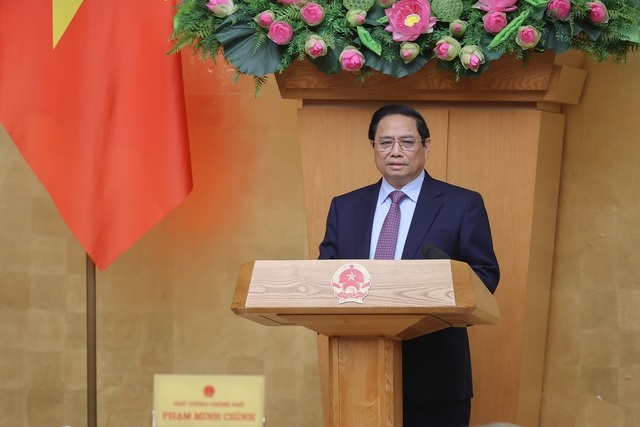On February 27, Prime Minister Pham Minh Chinh chaired the Government’s specialized meeting on legislation in February 2024. Attending the meeting were Deputy Prime Ministers, Ministers, heads of agencies, government agencies, leaders of ministries, sectors, and agencies.
At the meeting, the Government considered opinions and resolutions on many important issues: the Law on People’s Air Defense project; the Amendment to the Law on Management, Use of Weapons, Explosives and Supporting Tools project; the Amendment to the Cultural Heritage Law project; the amendment and supplementation of some articles of the Pharmacy Law project; the proposal to build the Diplomatic Service Law; the proposal to build the Civil Aviation Law project; the proposal to build the Railway Law project; the proposal to build the Industrial Technology Law project; the proposal to build the Law Program, Legislation in 2025, adjust the Law Program, Legislation in 2024…
 Prime Minister’s attention to some highlights, requirements in building and completing institutions – Photo: VGP/Nhat Bac
|
After listening to the opinions and discussions, Prime Minister Pham Minh Chinh provided conclusions and assigned specific tasks to complete the legislative projects and proposals.
In the amendment and supplementation of some articles of the Pharmacy Law project, the Prime Minister emphasized that pharmaceuticals are special goods and therefore, there must be special management policies while maintaining flexibility based on removing the mechanism of seeking permission, complying with market principles, simplifying administrative procedures for pharmaceutical production and business establishments, promoting decentralization and empowerment, enhancing the recognition and evaluation of compatibility with advanced countries. The Prime Minister also noted the need to encourage investment attraction and develop the pharmaceutical industry.
In the amendment to the Cultural Heritage Law project, the Prime Minister emphasized the requirement to preserve, promote and develop the cultural heritage of the nation, develop the cultural industry, promote investment and business in the field of cultural heritage, mobilize social resources through enhanced public-private cooperation; develop cultural human resources. The Prime Minister noted the need for thorough research, consultation of international experience, and expert opinions on regulations related to the management of artifacts based on tax administration. The Prime Minister also noted the need to encourage and have management policies for the operation of private museums; the provisions of this law should not overlap with the Archives Law.
In his overall conclusion at the meeting, Prime Minister Pham Minh Chinh acknowledged and highly appreciated the efforts and active preparations made by the ministries in preparing and submitting the legislative projects and proposals, seriously considering, explaining, and receiving heartfelt opinions and responsibilities from the members of the Government and the delegates at the meeting.
The Prime Minister requested the ministers to seriously consider and fully incorporate the opinions of the Government members, complete the legislative projects, and propose the construction of laws, propose the Law Program, Legislation; the Deputy Prime Ministers directly supervise and guide the implementation of the projects and plans as assigned; submit to the competent authorities according to regulations.
Regarding the preparation of the Law Program, Legislation in 2025, the adjustment of the Law Program, Legislation in 2024, the Prime Minister assigned the Ministry of Justice to take the lead and coordinate with the ministries and agencies in guiding and urging the submission of law construction proposals for consideration and approval by the Government; compile and submit the proposals of the Government to the National Assembly.
Regarding the preparation of legislative projects for the National Assembly to consider and comment at the upcoming 7th session, the number of legislative projects is very large, so the assigned task is very heavy. Therefore, the Prime Minister requested the ministers, heads of agencies to concentrate resources, lead and direct the completion of the projects in accordance with regulations.
For two projects, including the Amendment to the Notarization Law and the Anti-Trafficking in Persons Law, which were approved by the Government at the January 2024 specialized meeting, the Prime Minister assigned the Ministry of Justice and the Ministry of Public Security to take the lead and coordinate with the relevant ministries and agencies to complete the project files and submit them to the National Assembly Standing Committee within the specified time frame.
For the Urban and Rural Planning Law project, the Prime Minister assigned the Ministry of Construction to urgently correct and complete the project files and submit them to the competent authorities according to regulations.
Taking note of some highlights and requirements in building and completing institutions, the Prime Minister requested to promote the role of leaders, ministers, and heads of agencies in leading and directing the construction and completion of institutions; concentrate resources and have appropriate policies for officers and civil servants in charge of legal work, especially the construction and completion of institutions; further shorten the process of amending and supplementing legal normative documents to meet practical requirements; continue to consult international experience, absorb content suitable to the conditions and circumstances of our country; strengthen policy communication, especially communication in the process of construction, promulgation, and enforcement of laws, creating consensus and effectiveness.
The Prime Minister emphasized the need to ensure progress and improve the quality of legislative projects based on adhering to the Party’s lines and policies, laws and regulations related; remove difficulties, problems that have been regulated but have been overcome, and new issues not yet adjusted; strengthen policy response capacity; ensure the process and procedures comply with regulations.
The Prime Minister noted the requirement to design policies and regulations that ensure clear, concise, understandable, easy to implement, inspect, supervise, and evaluate; pay attention to listening to the opinions of experts, scientists, practitioners, enterprises, and people. For issues with different opinions, specific options should be designed, clarifying positions for competent authorities to consider and decide.
The Prime Minister particularly emphasized the requirement to eliminate the mechanism of seeking permission to prevent group interests, corruption, negative behavior, prevent wrongdoing; minimize and simplify administrative procedures, business conditions, not causing inconvenience, reducing costs and time for citizens and businesses; promote decentralization, empowerment together with appropriate allocation of resources, enhance enforcement capacity, strengthen inspection and supervision; mobilize all resources for development.












